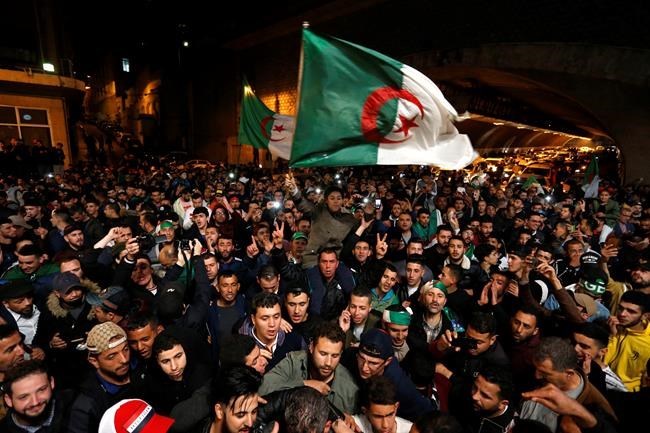
A crowd celebrates after ailing Algerian President Abdelaziz Bouteflika resigned after 20 years in power, Tuesday April 2, 2019 in Algiers. Bouteflika quit in a statement read on national television after the country's Defense Ministry aggressively called for Bouteflika to "immediately" vacate the office he held for two decades. (AP Photo/Toufik Doudou)
Republished April 03, 2019 - 3:04 AM
Original Publication Date April 03, 2019 - 2:11 AM
ALGIERS, Algeria - Algeria is facing a new era after President Abdelaziz Bouteflika's resignation — and questions about who's in charge and what happens next for this gas-rich country and key ally to the West in fighting terrorism.
Algeria's 12-member constitutional Council is expected to meet Wednesday to confirm the departure of a man who ruled the country for 20 years and had been a fixture in the Arab world's political landscape for decades.
A much-diminished Bouteflika, 82, appeared on images shown on national television Tuesday night handing his resignation letter to constitutional Council president Tayeb Belaiz. Bouteflika, who hasn't spoken publicly to the nation since a 2013 stroke, appeared pale and weak and wore a traditional robe instead of his habitual suits.
Algerian protesters who drove Bouteflika out celebrated his departure with songs and flag-waving in the capital Tuesday night — but it might not be enough to satisfy their demands for an overhaul of the political elite, seen as corrupt and secretive.
Algeria's Constitution says that when a president dies or resigns, the constitutional Council confirms the leader's absence and both houses of parliament convene. The president of the upper house is named as interim leader for 90 days while a presidential election is organized.
The current upper house president is Abdelkader Bensalah, who's a Bouteflika ally — as is Prime Minister Noureddine Bedoui, accused of contributing to fraud in the last presidential election in 2014 and cracking down on past protests. Demonstrators see many of those who would play a role in the transition as part of the same distrusted elite.
New protests are already planned for Friday, after six straight Fridays of mass, peaceful gatherings that surprised the entrenched leadership by their strength and persistence.
However the protest movement doesn't have a single, unifying alternative to the current political system.
Another question is what the influential military and Bouteflika's entourage will do next. Military chief of staff Ahmed Gaid Salah appeared to trigger Bouteflika's departure by pushing to get him declared unfit for office.
Countries around the world are watching Algeria's political crisis, wondering whether a transfer of power could impact gas and oil deliveries to Europe, Cuba and around Africa — or crucial security co-operation with Europe and the U.S.
Activists elsewhere are also cheering the Algerian protesters' victory.
The organizers behind months of anti-government demonstrations in Sudan welcomed Bouteflika's resignation — and expressed hope that Sudan's Omar al-Bashir will do the same.
Sarah Abdel-Jaleel, a spokeswoman for the Sudanese Professionals Association, told The Associated Press on Wednesday that Bouteflika's resignation shows the "success of peaceful resistance within Africa." She says it "definitely gives us all hope and reassurance that we must continue."
___
Angela Charlton in Paris and Samy Magdy in Cairo contributed.
News from © The Associated Press, 2019